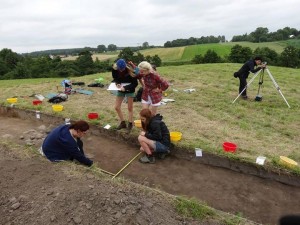On my first morning of working in the trench at Silchester I donned my dungarees, dinosaur t-shirt and bright pink wellies, then my best friend Emily and I marched out onto site with our trowels and a feeling of consternation about what on earth we were doing. Within a few days the two of us had settled in to the swing of things and finally given up our futile effort of keeping everything we owned clean. The guys on the dig seemed to take to the dirt a lot quicker than us, but in the end we accepted our muddy fate. By the end of the 4 weeks the two of us were barely recognisable with matted sun-dyed hair, mud-ridden clothes and a lackadaisical desire to sit outside with bottles of cider. The glamorous transformation into archaeologists had begun and we would never be the same again.
Nearly 3 years have now passed since that first day of digging and my experiences as a woman working in archaeology have, on the whole, proven to be extremely positive, with open-minded attitudes and equal opportunities for all; not only with regards to gender but also life-style, interests and personal choices. Everyone is accepted, partly because we all share the same love for digging up old things from the dirt (a love which many of my non-archaeology friends will never comprehend). However as I have found out, this equality is not the case across the whole board of academic excavations, and I am hoping that any gender-driven discrimination is brought to light, because the image of women in archaeology should ultimately mirror that of men.
I have spent my last three summers working at Silchester, and with such a large influx of students and volunteers, a great range of diversity hit the scene every season. Men and women of differing ages and backgrounds gathered together from all over the UK and beyond with a shared interest in archaeology. The best thing about working at Silchester was that even though there were so many different people, there was never a hint of discrimination, and it only took a few days for a muddy micro-community to take form. Similarly, last summer I excavated on the Isles of Scilly with a mixed group of people of different ages and gender. Although a lot smaller in comparison to Silchester, Scilly was the same in that everyone shared a mixture of tasks, some physically demanding and others less so. The group spirit of the field team was so strong that we all dined and explored together in the evenings and on our days off, and one night we even had a novel beach barbeque in a wheelbarrow. Even in times of crisis -such as when I lost a fight with a Neolithic stone- the group came together to help each other out. To be honest at both Silchester and Scilly gender issues never really crossed my mind, as everyone pulled together to get the work done.
Unfortunately, my experiences elsewhere have not always been so positive. On another excavation undertaken overseas in 2013 I found myself and close archaeology companion Lorna being constantly given tasks such as planning and finds processing, and generally being held back from undertaking any serious physical activity. We were rarely allowed to carry heavy loads or equipment back from site, whilst the men struggled under the weight of it all. Admittedly at the end of the first hot day digging I took this as a blessing, however I soon began to realise that I wanted to play an equal role and that those in charge obviously believed we were less capable of manual labour. As a result the two of us took it upon ourselves to show off our muscles and dig like we’d never dug before. Therefore there is definitely room for improvement in some attitudes, and I wholeheartedly believe that men and women each have their own personal strengths and weaknesses regardless of their gender. Nevertheless my experiences in the field have generally been very positive, and I have met such a fantastic mix of people in every case.
Now that University has sadly ended, I have noticed that a number of my female friends have gone on to do postgraduate study or are pursuing other forms of archaeology or heritage jobs, whilst many of my male friends have entered into the world of commercial field-work. I don’t think that this pattern is a reflection of any type of inequality within the sector, but more a reflection of personal choice and preferred working environment. As for me; I am currently working in Finds Processing but I know that one day soon I will don my steel toe caps once more and be reunited with the ancient soils.
Lizzy Raison. A bit about today’s blogger – Since finishing my degree in Archaeology and History at Reading I have been all over the shop trying to get heritage and archaeology work under my belt. Last summer I went to work at Silchester as an Environmental and Database Assistant, before taking part in the Neolithic excavation on the Isles of Scilly. I then worked for the National Trust up until Christmas in an unpaid conservation role, which gave me fantastic experience in the day to day running of a historic property. Plus I got to live in a POW hut in the eerie estate woodland for three months, which was an adventure in itself. Since the New Year I have been working as a Finds Processor at Cotswold Archaeology, which has so far proved to be a great job. The people are lovely, there’s tea on tap and most importantly I find myself learning something new every day.




